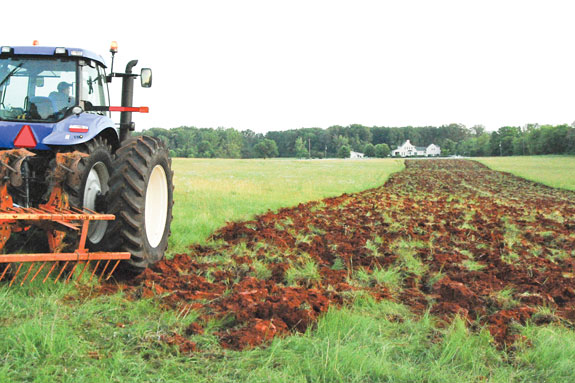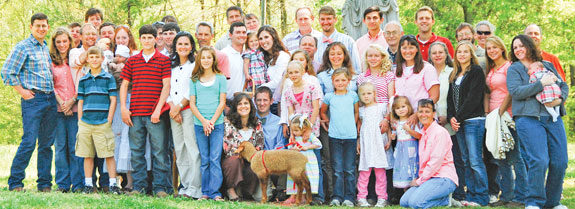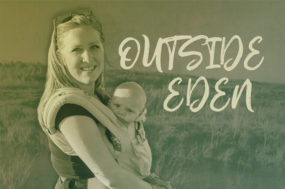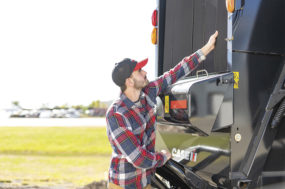“Whatever we try to do here, we try to do it right,” says Tony Colafrancesco, a 25-year-old missionary at Caritas of Birmingham. “We try to do it the way God intended it.”
Caritas of Birmingham is a mission that encourages people to pray and teaches family values through counseling and books. They also show families those values by how their community works together on every project.
Their tie to forages stemmed from these principles. They worried about the children in the mission watching TV, because of the lack of values portrayed. In order to help them live life instead of watch it, they traded the TVs for horses, cows and pigs.
To help take care of the animals without taking away from the mission, they started growing their own forages. After 15 years of growing grasses and hay, they have developed a simple but effective management system.
“The grass is a byproduct,” says Colafrancesco, who heads up the crop duties for the mission. “Kind of like the industry is saying right now, ‘You’re not raising beef, you’re raising grass.’
We take that a step further and say we aren’t raising grass – we’re promoting healthy soil, which gives us good, quality grass and hay, which gives us quality meat, etc. If we get the soil right instead of spraying herbicides, pesticides and commercial fertilizers and everything being a counter-effect of each other, our plants will be healthier.”
He also says a close look at samples is needed. Sometimes the chemical nitrogen can seem like protein, but won’t really help the animal.
“Some guys might say, ‘My Bermuda hay is 21 percent protein,’ and they chemically fertilize it and put tons of nitrogen on it,” says Colafrancesco. “They are getting a false nitrogen count in the hay and they are reading that as protein. That doesn’t mean that the horse or cow that is going to eat it is going to get that much protein out of it.”
He is quick to point out they aren’t hippies and they aren’t an organic or “sustainable” farm, although by many standards they would be considered one. Colafrancesco describes it as a free range, natural or nutrient-dense farming system that isn’t always taking away but giving back to the soil.
“We are learning as we go, and we are not masters of it yet, but we have learned that the weeds and everything are tale-tell signs of soil imbalances and different things that are wrong with the soil,” Colafrancesco says.
“When you get the soil right it fixes itself. For example, when the soil is lacking a mineral and the microbes are alive, they can change the composites of the soil to match the needs of the plants in the soil. When we started this, we saw weeds we never had seen before, because the soil was coming back into balance.”

They have found the balance by putting down compost tea, 30 gallons per acre – about 50,000 gallons a year – after each cutting during the year.
The tea is a compilation of fish emulsion, molasses, compost and water and some other minerals depending on the soil samples. Colafrancesco says they get their fish emulsion from a company in Massachusetts that treats their product like raw milk.
“The more you heat something up, whether it be your milk to pasteurize it or your food, the more you cook it the more you kill in it,” Colafrancesco says.
“Sometimes that can be a good thing – if it’s going to make you sick you need to heat it up and cook it – but in something like a fertilizer, some of the companies heat up their fish emulsion products, which kills some of the enzymes and bacteria that are good for the soil.”
The company they use doesn’t heat up their fish “gurry” but they circulate it and add phosphoric acid to it to balance the pH levels. Members of the mission make a trip up to Massachusetts with a tanker and bring it back to the community.
Using creek water, they will mix the water and compost in an induction tank until it becomes “muddy looking.” Then they add the fish emulsion, molasses and minerals in 1,500-gallon batches of compost tea.
Colafrancesco says they take it immediately to the fields for application because after 48 hours the microbes start to die. Understandably so, this muddy, fishy substance doesn’t spray like water, or smell like it either.
“It has a sweet smell to it, but it also has a fishy smell,” says Colafrancesco, chuckling at the description of the offensive smell. “You get used to it. Occasionally you make a turn on the open-cab tractor and get wind of it, but it’s not too bad.
“You have to get special tips on your sprayer to get that kind of flow,” he continues. “Sometimes there are particles that get stuck in the nozzles; pieces of grass, fish bone, leaves or whatever.
It goes through a filter when it’s pumped into the truck, but it doesn’t get everything out. So we have to get off and clean them out. It’s kind of nasty stuff and it’s a dirty job; you definitely don’t want to be doing it in your nicest tractor, but we have seen the benefits of it.”
The benefits are better forages, better milk quality and healthier soil. Hay Alabama is known by its customers to have top-quality hay.
The type of hay can vary a little bit; they have grown just about everything – from sorghum and Sudan grasses to Bermuda and Bahia – but most of their fields are Bahia, which is a grass native to the area.
“Bahia is finer and more leafy, whereas the Bermuda grass is more woody and fibrous,” says Colafrancesco, whose main clientele are horse owners looking for high-quality square bales. “It’s not as productive as Bermuda, but the quality is better. It’s also more palatable than Bermuda.
We have some fields of Bermuda, but we believe in getting away from the hybrid stuff and going more with the natural grasses. If you don’t manage Bermuda and take care of it like it’s a baby, it will eventually get taken over by something else.”
Because it is native to the area, many horse owners in the Southeast commonly think of Bahia as a low-quality forage and are quick to dismiss it.
Colafrancesco tells them they might want to try the mission’s bales and see what the horses think. “It can be a really good, quality grass hay if it’s done right, or it can be junk just like anything else.
“We have people call and say they have been raising horses forever and they need coastal Bermuda,” he continues. “Then there are other people that were hooked on Bermuda and thought it was the best thing and say they used to feed Bermuda but they love the Bahia bales because of the finer stem and tenderness of the leaves.”
Farmers in the Southeast have high heat and high humidity as well as frequent rains that make quality hay difficult to manage. With 400 acres of hay to cut, rake and bale, Caritas of Birmingham decided to invest in the largest basket rake in the state – and to the knowledge of Colafrancesco, the whole Southeast.
“When we purchase equipment it’s always a long-term decision. Because we are a mission we want to make sure we get the right thing,” he says.
“Because of the way we operate and our labor situation, we have so many different things that need to be done; we don’t have forever to spend putting up hay.
Plus trying to do high-quality hay, you only have a window of time to do it in. Also, the more hay we can get in a row, the better. That’s less time we spend driving around baling hay, too.”
After reviewing articles, testing equipment and visiting dealerships, they ultimately went with a 28-foot basket rake that could keep a round baler and square baler constantly going. Now that they can rake hundreds of acres in a few hours, they have more time to get back to the mission.
Missionaries generally are pictured with Bibles in their hands, not bales of hay or cleaning out nozzles on a sprayer, but the missionaries of Caritas of Birmingham find it rewarding because to them it’s the way God intended it to be done.
“The Bible says, ‘By the sweat of thy brow though shalt eat,’” quotes Colafrancesco. “Plus, with the mission we wanted to get away from the dollar. If money dried up one day, we wouldn’t have a huge overhead. We could support ourselves and still run our mission of helping families.”
“We aren’t trying to be organic, we are trying to do it the way God intended it to be done,” Colafrancesco says. FG
To learn more about Caritas of Birmingham,
PHOTOS
PHOTO 1:The whole community of Caritas gathers for a photo on a sunny summer day. There are about 50 members that live on the mission.
PHOTO 2: Their hay is a byproduct of the soil management system they have developed. The nutrients, not chemicals, they have incorporated into the soil have already paid off with better yield, higher nutrition value and healthier soil life. Photos courtesy of Caritas of Birmingham.











